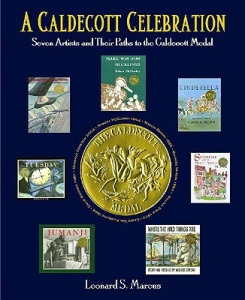2018 School Spending Survey Report
Review of A Caldecott Celebration: Six Artists and Their Paths to the Caldecott Medal
A Caldecott Celebration: Six Artists and Their Paths to the Caldecott Medal
Leonard S.
 A Caldecott Celebration: Six Artists and Their Paths to the Caldecott Medal
A Caldecott Celebration: Six Artists and Their Paths to the Caldecott MedalLeonard S. Marcus
Intermediate Walker 49 pp.
10/98 ISBN 0-8027-8656-1 $18.95 g
Library edition ISBN 0-8027-8658-8 $19.95
In observance of the sixtieth anniversary of the Caldecott Medal, Leonard Marcus, noted for his critical work in the history of children's literature, presents a gathering of essays on six of the honorees, one from each decade. A concise introduction provides historical background for the award, the rationale for its name, the selection process, and the influence of the honor on the lives of the recipients. The artists, listed in chronological order, include Robert McCloskey, Make Way for Ducklings (1942); Marcia Brown, Cinderella; or, The Little Glass Slipper (1955); Maurice Sendak, Where the Wild Things Are (1964); William Steig, Sylvester and the Magic Pebble (1970); Chris Van Allsburg, Jumanji (1982); and David Wiesner, Tuesday (1992). The format for each essay is the same, eliciting a feeling of thematic unity: a reproduction of the jacket paired with a photograph of the illustrator as he or she appeared when the book was published; title of the winning book; a brief acknowledgment of essential biographical facts; the name of the publisher; and the medium used for the illustrations. A pertinent quote from the artists' Caldecott acceptance speeches precedes the individual studies. The text is remarkable for the smooth integration of explanatory material with overall commentary, and selective detail creates a sense of intimacy and understanding. The research never overpowers the narrative, but the reader knows that it is there — a firm footing for the structure it supports. A fresh, inviting examination of an established process and ritual. With a listing of Caldecott medal winners, 1938-1998; glossary; and index of proper names.
RECOMMENDED
ALREADY A SUBSCRIBER? LOG IN
We are currently offering this content for free. Sign up now to activate your personal profile, where you can save articles for future viewing.






Add Comment :-
Be the first reader to comment.
Comment Policy:
Comment should not be empty !!!